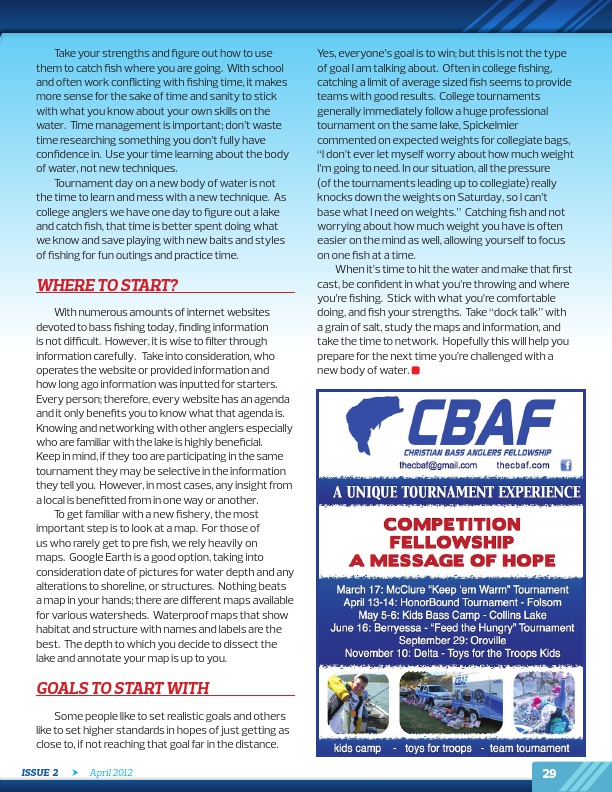
take your strengths and figure out how to use them to catch fish where you are going. With school and often work conflicting with fishing time, it makes more sense for the sake of time and sanity to stick with what you know about your own skills on the water. time management is important; don’t waste time researching something you don’t fully have confidence in. Use your time learning about the body of water, not new techniques. tournament day on a new body of water is not the time to learn and mess with a new technique. as college anglers we have one day to figure out a lake and catch fish, that time is better spent doing what we know and save playing with new baits and styles of fishing for fun outings and practice time.
WHERE TO START?
With numerous amounts of internet websites devoted to bass fishing today, finding information is not difficult. However, it is wise to filter through information carefully. take into consideration, who operates the website or provided information and how long ago information was inputted for starters. every person; therefore, every website has an agenda and it only benefits you to know what that agenda is. Knowing and networking with other anglers especially who are familiar with the lake is highly beneficial. Keep in mind, if they too are participating in the same tournament they may be selective in the information they tell you. However, in most cases, any insight from a local is benefitted from in one way or another. to get familiar with a new fishery, the most important step is to look at a map. For those of us who rarely get to pre fish, we rely heavily on maps. Google earth is a good option, taking into consideration date of pictures for water depth and any alterations to shoreline, or structures. Nothing beats a map in your hands; there are different maps available for various watersheds. Waterproof maps that show habitat and structure with names and labels are the best. The depth to which you decide to dissect the lake and annotate your map is up to you.
Yes, everyone’s goal is to win; but this is not the type of goal i am talking about. often in college fishing, catching a limit of average sized fish seems to provide teams with good results. College tournaments generally immediately follow a huge professional tournament on the same lake, Spickelmier commented on expected weights for collegiate bags, “i don’t ever let myself worry about how much weight i’m going to need. in our situation, all the pressure (of the tournaments leading up to collegiate) really knocks down the weights on Saturday, so i can’t base what i need on weights.” Catching fish and not worrying about how much weight you have is often easier on the mind as well, allowing yourself to focus on one fish at a time. When it’s time to hit the water and make that first cast, be confident in what you’re throwing and where you’re fishing. Stick with what you’re comfortable doing, and fish your strengths. take “dock talk” with a grain of salt, study the maps and information, and take the time to network. Hopefully this will help you prepare for the next time you’re challenged with a new body of water.
GOALS TO START WITH
Some people like to set realistic goals and others like to set higher standards in hopes of just getting as close to, if not reaching that goal far in the distance.
Issue 2
April 2012
29
http://www.thecbaf.com mailto:thecbaf@gmail.com